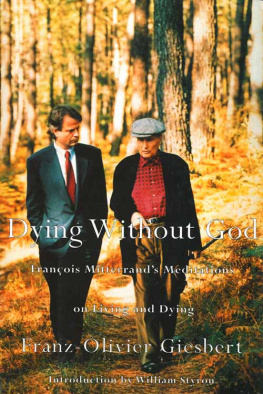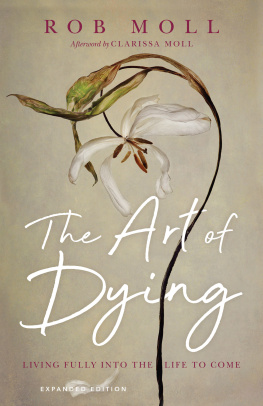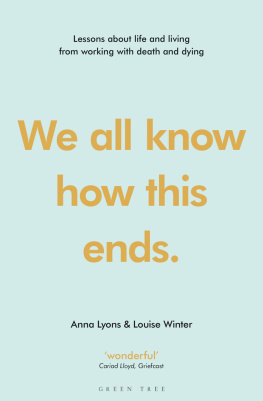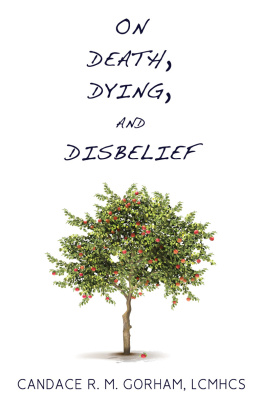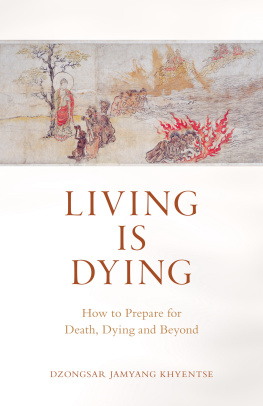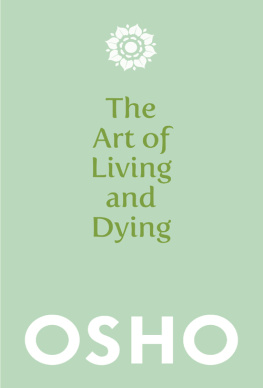Acknowledgements

I START BY REPRISING MY dedication. This book would not have been possible without the generosity of countless patients and their families, who have allowed me to care for them and shared their stories so that we may all learn from their experiences. To navigate one of lifes most challenging events, the process of dying, and still retain the capacity and the will to care about others is extraordinary and I owe these selfless people a mountain of debt. They teach me how to be a better doctor and a more thoughtful person and I am confident that their stories will illuminate the lives of others.
Any creative process begins with someone believing in a vague idea. I thank my agent, Clare Forster, for reconnecting me with the wonderful Dan Ruffino of Simon & Schuster Australia, who could have said maybe, but chose to say yes and quietly empowered me to write this book. Claire de Medici, Katie Stackhouse, Shannon Kelly, Mark Evans and Lisa White have painstakingly transformed a disbanded draft into a real book, which always seems impossible until it isnt. The lovely Anna OGrady and the sales team deserve praise for working tirelessly behind the scenes. As do Chris Lemoh, Irene Wagner, Kate Richards and Andrea McNamara and the team at The Guardian for helping me see further.
I reserve my greatest thanks for my publisher, Roberta Ivers, for two things her diligent attention to my writing and her steadfast confidence in me. One cannot contemplate the weighty issue of what it means to live and die well without feeling uncertain and, sometimes, hopelessly lost. The task of an able publisher might be to simply redirect an author, but Ive been enriched by Robertas decency and friendship.
Its amazing that the love and support of my family has stayed constant through the demands of writing another book. For this, I thank my wonderful parents, Urmila and Kaushal, and my brother, Rajesh, for believing in me. I also thank Rosemary, Geoff, Taru and Helen for their support.
I would be a lesser writer without my husband, Declan, who specialises in conjuring ideas when he cant sleep and jotting them down for me while I sleep. To Rohan, Anjali and Sachin, thank you for your help in big and small ways. Im lucky to have you and you know that there is no greater joy in my life than being your mother.
Ranjana Srivastava
Also by Dr Ranjana Srivastava
What It Takes to Be a Doctor
A Cancer Companion: An oncologists advice on diagnosis, treatment and recovery
After Cancer: A guide to living well
So Its Cancer: Now What? An experts guide to what you need to know
Dying for a Chat: The communication breakdown between doctors and patients
Tell Me the Truth: Conversations with my patients about life and death
About the Author

Author photo Declan Green
Dr Ranjana Srivastava OAM is a practising oncologist, internationally published and award-winning author, broadcaster and Fulbright scholar.
She is a fellow of the Royal Australasian College of Physicians and works in the public hospital system. In 2017, Ranjana was awarded the Medal of the Order of Australia for her contribution to doctorpatient communication and was recognised by Monash University as a Distinguished Alumni of the Year.
Her writing has been published worldwide, including in Time magazine and The Week , and in prominent medical journals such as The New England Journal of Medicine , Lancet , and Journal of the American Medical Association . In 2018 she was a finalist in the Walkley Awards for her work as a regular columnist for The Guardian newspaper. Her acclaimed non-fiction books include Tell Me the Truth: Conversations with My Patients about Life and Death (shortlisted, NSW Premiers Literary Awards), Dying for a Chat: The Communication Breakdown Between Doctors and Patients (winner, Human Rights Literature Prize) and What It Takes to Be a Doctor (finalist, Australian Career Book Award). She lives in Victoria.
See www.ranjanasrivastava.com
simonandschuster.com.au
Authors.SimonandSchuster.com.au/Dr-Ranjana-Srivastava
Simon & Schuster
Believing

The most difficult thing in life is to know yourself.
Thales
D YING GIVES RISE TO deep emotions to sort through and prioritise them is a monumental task that needs genuine attention and quiet space for reflection, planning, mourning, celebration and consolation. But the irony of modern medicine is that amid all that it seeks to do to the patient , it doesnt really make room for the person .
Simply observing my patients shows me the directions they are impossibly tugged in. Tracking appointments, having tests, ensuring providers communicate, planning transport, finding help, grappling with bills, negotiating work, explaining their illness to others, and avoiding stressful well-wishers these are just the tasks I hear about, but I imagine the list is never-ending. Indeed, its reasonable to ask: wheres the time for hapless patients to slip out of their exhausting routine and ponder life and legacy?
For a striking number of people, this never happens. Im amazed by the number of people who say that they have never thought about their death, even in the abstract. Not all of them are young; many are middle-aged and well beyond. But I also regularly meet those whove handled the subject of death admirably in embodiment of the Talmudic quote, Live well, its the greatest revenge.
Although our death is certain, I imagine wed rather suspend belief. Every day at work I encounter fixed views that the solution to any illness is but one prescription away and that death can be forestalled by the right idea. The media has a large role to play in this, peppering unrealistic stories with terms like game-changer, breakthrough and innovative. Social media compresses them into a format that is digestible but ill-explained. The stories often involve patients who were deemed beyond salvage and laud doctors for rescuing them. Such events are actually rare, but they affect how all of us think about the reach of medicine.
Recently I read a report about a young woman with a rare and aggressive cancer one most oncologists have never even heard of who persuaded her doctor to give her a new drug that had not previously been known to work for her disease. She had endured many painful and unsuccessful treatments for years but immediately after taking the new drug, her disease melted away, permitting her to resume work and heavy workouts at the gym.
Although the details were verifiably true, I thought that what matched the patients remarkable recovery was her oncologists sanguine observation.
Instead of heralding a miracle, he said he was befuddled by the result, pledging to devote his life to finding out why his patient was an outlier. I wish more doctors would adopt such a balanced approach.
I once met a patient who was expected to die from cancer-related liver failure. Palliative care was called but he refused to talk to anyone who even mentioned end-of-life care. He wanted more chemotherapy, which was unsafe as it could precipitate massive bleeding or a coma, but somehow he twisted an oncologists arm to prescribe chemotherapy. He died in his chemotherapy chair while receiving treatment, an awful sight for everyone who was present. At the mortality audit, every provider felt contrite and yet everyone knew that it wasnt the first or last time such a thing had occurred.


